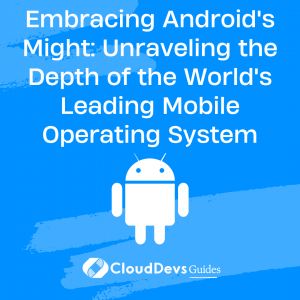Embracing Android’s Might: Unraveling the Depth of the World’s Leading Mobile Operating System
Android, Google’s open-source mobile operating system (OS), has evolved significantly since its inception in 2007. Today, with over 2.5 billion active devices worldwide, it stands as the most widely-used mobile OS, fundamentally redefining our interaction with smartphones and extending into wearables, televisions, and automobiles. As businesses recognize the versatility of this platform, many choose to hire Android developers to unlock its full potential.
This blog post will delve deep into the power of Android, providing a comprehensive overview of its capabilities, features, and impact on technology, offering insights on why hiring skilled Android developers could be transformative for your tech strategy.
Flexibility and Customizability
Android stands tall amongst its competitors due to its flexibility and customizability. As it’s an open-source platform, manufacturers can modify the OS to suit their devices. For instance, Samsung’s One UI and OnePlus’s OxygenOS are built on Android but provide unique user interfaces and features. This level of customization extends to the users too, allowing them to personalize their devices from the choice of the launcher, the arrangement of apps, to the overall look and feel of the interface.
For developers, the flexibility of Android enables them to craft innovative apps that can leverage device-specific hardware and software features. One such example is the Google Camera app, which uses computational photography techniques to improve image quality on Pixel devices.
Broad Hardware Integration
Android’s power extends to its integration with diverse hardware. Unlike other mobile operating systems, Android is not tied to specific hardware and runs on a wide range of devices from different manufacturers, including Samsung, LG, OnePlus, and more.
A striking example of this is the Galaxy Z Fold series from Samsung. This device is a testament to Android’s adaptability, changing its interface orientation and app layout seamlessly when the phone is unfolded into a tablet-like display. This was possible thanks to Android’s support for flexible displays and multi-window applications.
Google Services Integration
Android’s deep integration with Google Services sets it apart. Gmail, Google Maps, Google Assistant, and the Play Store, among others, are woven into the very fabric of the Android ecosystem. The “At a Glance” widget on Pixel devices, for instance, displays pertinent information from your calendar, the weather, or even traffic conditions for your commute, all sourced from Google services.
Furthermore, Google Assistant, the AI-powered virtual assistant, provides a unique, voice-driven interaction model on Android. From setting reminders and sending texts to controlling smart home devices, the Google Assistant expands Android’s capabilities while providing a hands-free user experience.
Android and Emerging Technologies
Android’s open nature also enables it to quickly adopt and adapt to emerging technologies. Augmented reality (AR), virtual reality (VR), and machine learning are areas where Android has made significant strides.
For example, Google’s ARCore is a platform for building AR experiences on Android. It allows apps like Google Lens to identify objects, texts, and even landmarks in real-time using your phone’s camera. Similarly, VR experiences are made possible on Android through platforms like Daydream, which provide immersive experiences right from your phone.
Moreover, Android’s on-device machine learning capabilities have powered features like Now Playing on Pixel devices, which uses deep neural networks to identify songs playing around you, all while preserving your privacy.
Android Beyond Smartphones
The power of Android isn’t just limited to smartphones. The platform’s reach extends to other devices such as smart TVs (Android TV), smartwatches (Wear OS), and even cars (Android Auto). These variations provide the same Google and Android experiences tailored to different devices and contexts.
For instance, Android TV not only allows users to stream content but also download apps and games from the Google Play Store. Similarly, Android Auto integrates with your car’s infotainment system, providing navigation, communication, and music controls in a driver-friendly interface.
Security and Privacy
Android’s power also lies in its approach to security and privacy. With features like Google Play Protect, which scans apps for harmful behavior, and monthly security updates, Android is committed to keeping users safe. This dedication to security is one of the reasons businesses are motivated to hire Android developers, ensuring their applications are not just effective, but also secure. Additionally, Android 10 and beyond have introduced more granular permissions, giving users, and the developers who serve them, better control over what data apps can access.
Conclusion
Exploring the power of Android reveals a platform defined by flexibility, diversity, and innovation. From personalized user experiences and broad hardware compatibility to deep Google services integration and adoption of emerging technologies, Android has proven to be a driving force in the mobile and connected device ecosystem. Its continuous strides in security and privacy further accentuate its robustness.
Indeed, Android’s power extends far beyond being a mere operating system; it represents a versatile ecosystem that continually adapts to the evolving needs of users, developers, and manufacturers. This adaptability and continual innovation underline the importance of businesses to hire Android developers who can leverage these advancements for tailored solutions. As we look forward to more developments, one thing remains clear: Android’s power lies not just in its capacity to innovate, transform, and redefine the digital landscape, but also in the opportunities it presents to Android developers to create applications that can significantly enhance user experiences.
Table of Contents






